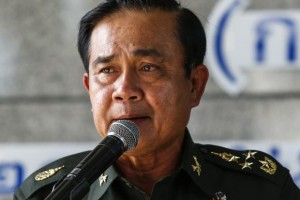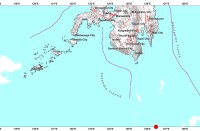
(Reuters) – Thailand’s army chief General Prayuth Chan-ocha seized control of the government on Thursday (May 22), saying the army had to restore order and push through reforms, two days after he declared martial law.
Prayuth made the announcement in a television broadcast after he held a meeting with all rival factions aimed at finding a solution to six months of anti-government protests.
He said the takeover would not affect international relations.
Also on Thursday, Thailand’s military chief pressed political rivals to end a drawn-out power struggle that has polarized the country and battered its economy, after neither side gave ground in a first round of army-brokered talks.
Army chief General Prayuth declared martial law on Tuesday (May 20) to prevent more violence between government supporters loyal to ousted former Prime Minister Thaksin Shinawatra and anti-government protesters backed by the royalist establishment.
The army has rejected accusations that martial law amounts to a coup.
It has let rival protesters remain on the streets but banned them from marching to prevent clashes. It has also clamped down on media, including partisan television channels, and warned people not to spread inflammatory material on social media.
Prayuth has called on the two sides to agree on a compromise that is likely to hinge around the appointment of an interim prime minister, political reforms and the timing of an election.
Wednesday’s (May 21) talks ended inconclusively with neither side backing down from their entrenched positions, participants said. The second session began on Thursday.
“Many of you have issues with each other. I would like to tell you that I am trying my best to restore peace and please don’t be concerned for me, I’m already old, I will take responsibility for all my actions,” he said in the meeting room.
Former telecommunications tycoon Thaksin has lived in self-exile since 2008 to avoid a jail term for graft, but still commands the loyalty of legions of rural and urban poor and exerts a huge influence over politics, most recently through a government run by his sister, Yingluck Shinawatra.
Yingluck was forced to step down as premier by a court two weeks ago, but her caretaker government remains nominally in power, despite the declaration of martial law and six months of sometimes violent protests aimed at ousting it.
Thailand’s gross domestic product contracted 2.1 percent in January-March from the previous three months, adding to fears the country is stumbling into recession.






